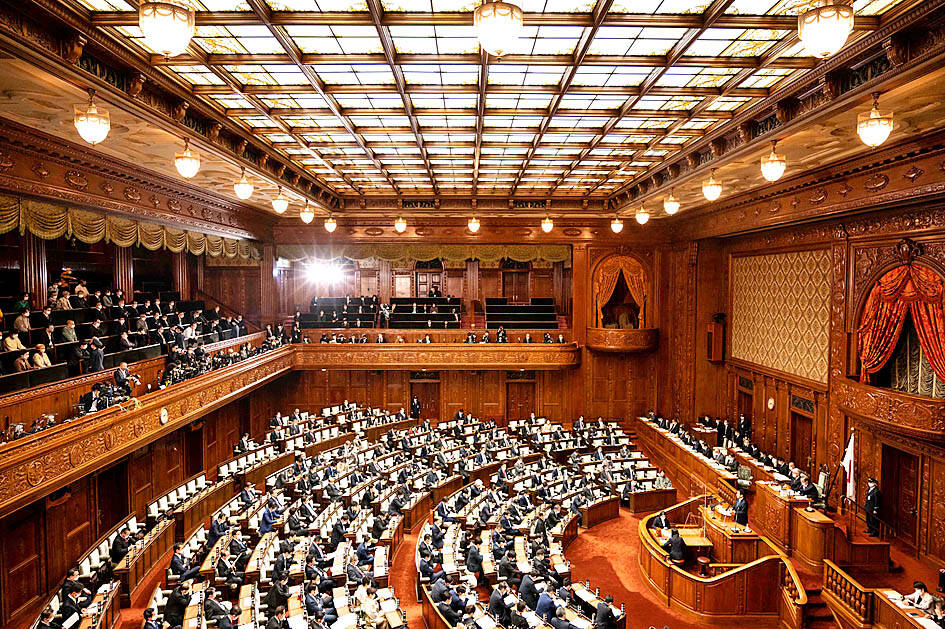Japan faces the severest security environment in the region since the end of World War II, Japanese Prime Minister Fumio Kishida said yesterday, pledging to push a military buildup under a newly adopted security strategy, as well as tackle rapidly declining births so the country can sustain national strength.
Kishida’s government last month adopted key security and defense reforms, including a counterstrike capability that breaks from the country’s exclusively self-defense-only postwar principle.
Japan says the current deployment of missile interceptors is insufficient to defend it from rapid weapons advancement in China and North Korea.

Photo: AFP
In his policy speech at parliament’s opening, Kishida said active diplomacy should be prioritized, but it requires “defense power to back it up.”
He said that Japan’s new security strategy is based on a realistic simulation, “as we face the most severe and complex security environment since the end of World War II and a question if we can protect the people’s lives in an emergency.”
The strategy seeks to keep in check China’s increasingly assertive territorial ambitions, but it is also a sensitive issue for many countries in Asia that were victims of Japanese wartime aggression.
Kishida said it is a “drastic turnaround” of Japan’s security policy, but still remains within the limitations of its pacifist constitution and international law.
“I make it clear that there will not be even a slightest change from Japan’s non-nuclear and self-defense-only principles and our footsteps as a peace-loving country,” Kishida said.
While the security strategy said China presents “an unprecedented and the greatest strategic challenge” to the peace and security of Japan and the region, Kishida said he hoped to maintain dialogue with Beijing, including with Chinese President Xi Jinping (習近平), to found “constructive and stable relations.”
Japan plans to nearly double its defense budget within five years to ¥43 trillion (US$331.3 billion) and improve cyberspace and intelligence capabilities. While three-quarters of an annual defense budget increase can be squeezed out through spending and fiscal reforms, the remainder needs to come from a possible tax increase, and Kishida has already faced growing criticism from opposition lawmakers and even from his governing party.
Kishida also faces a critical question of population growth.
“We cannot waste any time on the policies for children and childrearing support,” he said. “We must establish a children-first economic society and turn around the birthrate.”
Japan’s population of more than 125 million has been declining for 14 years and is projected to fall to 86.7 million by 2060. A shrinking and aging population has huge implications for the economy and national security.
Kishida pledged to bolster financial support for families with children, including more scholarships, and said he would compile a set of measures of “different dimensions.”

DEFENDING DEMOCRACY: Taiwan shares the same values as those that fought in WWII, and nations must unite to halt the expansion of a new authoritarian bloc, Lai said The government yesterday held a commemoration ceremony for Victory in Europe (V-E) Day, joining the rest of the world for the first time to mark the anniversary of the end of World War II in Europe. Taiwan honoring V-E Day signifies “our growing connections with the international community,” President William Lai (賴清德) said at a reception in Taipei on the 80th anniversary of V-E Day. One of the major lessons of World War II is that “authoritarianism and aggression lead only to slaughter, tragedy and greater inequality,” Lai said. Even more importantly, the war also taught people that “those who cherish peace cannot

STEADFAST FRIEND: The bills encourage increased Taiwan-US engagement and address China’s distortion of UN Resolution 2758 to isolate Taiwan internationally The Presidential Office yesterday thanked the US House of Representatives for unanimously passing two Taiwan-related bills highlighting its solid support for Taiwan’s democracy and global participation, and for deepening bilateral relations. One of the bills, the Taiwan Assurance Implementation Act, requires the US Department of State to periodically review its guidelines for engagement with Taiwan, and report to the US Congress on the guidelines and plans to lift self-imposed limitations on US-Taiwan engagement. The other bill is the Taiwan International Solidarity Act, which clarifies that UN Resolution 2758 does not address the issue of the representation of Taiwan or its people in

Taiwanese Olympic badminton men’s doubles gold medalist Wang Chi-lin (王齊麟) and his new partner, Chiu Hsiang-chieh (邱相榤), clinched the men’s doubles title at the Yonex Taipei Open yesterday, becoming the second Taiwanese team to win a title in the tournament. Ranked 19th in the world, the Taiwanese duo defeated Kang Min-hyuk and Ki Dong-ju of South Korea 21-18, 21-15 in a pulsating 43-minute final to clinch their first doubles title after teaming up last year. Wang, the men’s doubles gold medalist at the 2020 and 2024 Olympics, partnered with Chiu in August last year after the retirement of his teammate Lee Yang

The Philippines yesterday criticized a “high-risk” maneuver by a Chinese vessel near the disputed Scarborough Shoal (Huangyan Island, 黃岩島) in a rare incident involving warships from the two navies. The Scarborough Shoal — a triangular chain of reefs and rocks in the contested South China Sea — has been a flash point between the countries since China seized it from the Philippines in 2012. Taiwan also claims the shoal. Monday’s encounter took place approximately 11.8 nautical miles (22km) southeast” of the Scarborough Shoal, the Philippine military said, during ongoing US-Philippine military exercises that Beijing has criticized as destabilizing. “The Chinese frigate BN 554 was